Humans fear great white sharks more than many other creatures that dwell in the ocean. While they’re certainly dangerous, they’re not the worst thing in the waters these days. Also, they pale in comparison to the horrors that once waited in the deep. To illustrate that point, we’re going to have a hypothetical battle between the largest sea-dwelling crocodile vs. a great white shark.
You’ll see how easy it is for Machimosaurus rex, the largest sea-dwelling crocodile, to match with the great white shark. We’ll take some time to show you how the two animals are alike and different, and then we’ll tell you which one is most likely to win the battle.
Comparing the Largest Sea-Dwelling Crocodile and a Great White Shark
What 3 Are Key Differences Between the Largest Sea-Dwelling Crocodile and a Great White Shark?
The biggest differences between the largest sea-dwelling crocodile and a great white shark are their size, speed, and the shape of their teeth. The sea-dwelling crocodile was much larger than the average great white shark, weighing between 5,000 and 6,600 pounds and growing possibly up to 35 feet long while the great white weighs between 1,500 and 2,400 pounds on average and grows between 11 and 16 feet on average.
Machimosaurus rex may have had a swim speed that was near or less than 20 mph based on saltwater crocodiles that exist today, but we don’t know for certain. Meanwhile, a great white shark can swim at speeds of 20 to 35 mph at its top speed.
Lastly, the teeth of a great white shark are sharp and serrated, designed to tear flesh, but the largest sea-dwelling crocodile had blunt-tipped, bullet-shaped teeth that were made to hold prey and crush bones.
These key differences will play a major role in determining which of these animals would win the fight, but we need more data and context to decide the winner.
What Are the Key Factors in a Fight Between the Largest Sea-Dwelling Crocodile and a Great White Shark?
Most fights in the animal kingdom can be broken down according to five factors. They include predation methods, offensive powers, defenses, speed, and size. By exploring each of these elements for both creatures and comparing them, we can find out which animal has certain advantages in this fight. Let’s begin breaking down these factors.
Largest Sea-Dwelling Crocodile vs. Great White Shark: Size
The largest sea-dwelling crocodile is bigger than a great white shark. The Machimosaurus rex weighed between 5,000 and 6,600 pounds and grew from 20 to 23 feet long, possibly up to 35 feet. The average great white shark weighs 1,500 pounds to 2,400 pounds, but it can reach 5,000 pounds in total weight. They grow about 11 to 16 feet on average, but they can get as long as 21 feet long.
The largest sea-dwelling crocodile has the size advantage.
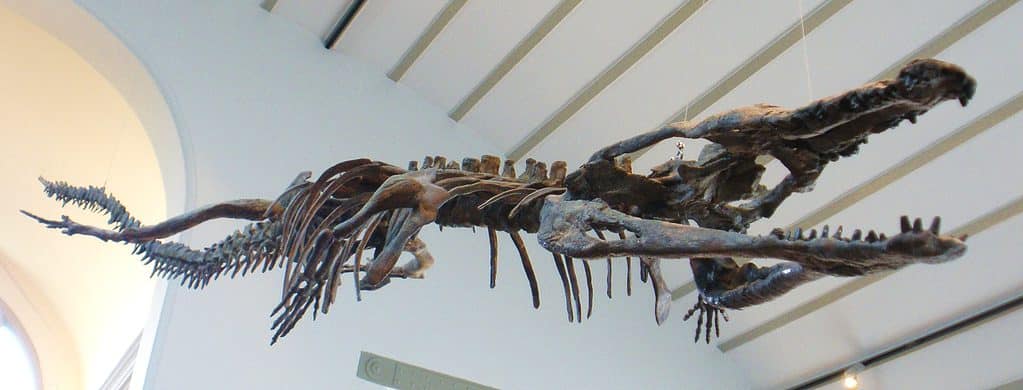
©Ghedoghedo, CC BY-SA 3.0 <https://ift.tt/40PQV3R>, via Wikimedia Commons – License
Largest Sea-Dwelling Crocodile vs. Great White Shark: Speed
The great white shark is probably faster than the crocodile. Humans know that great white sharks can use a burst of speed to reach about 35 mph while hunting. The largest sea-dwelling crocodile probably could only muster about 20 mph based on the speed achieved by modern saltwater crocodiles. At any rate, it doesn’t seem likely that they could swim as fast as a great white.
The great white shark has a speed advantage in this fight.
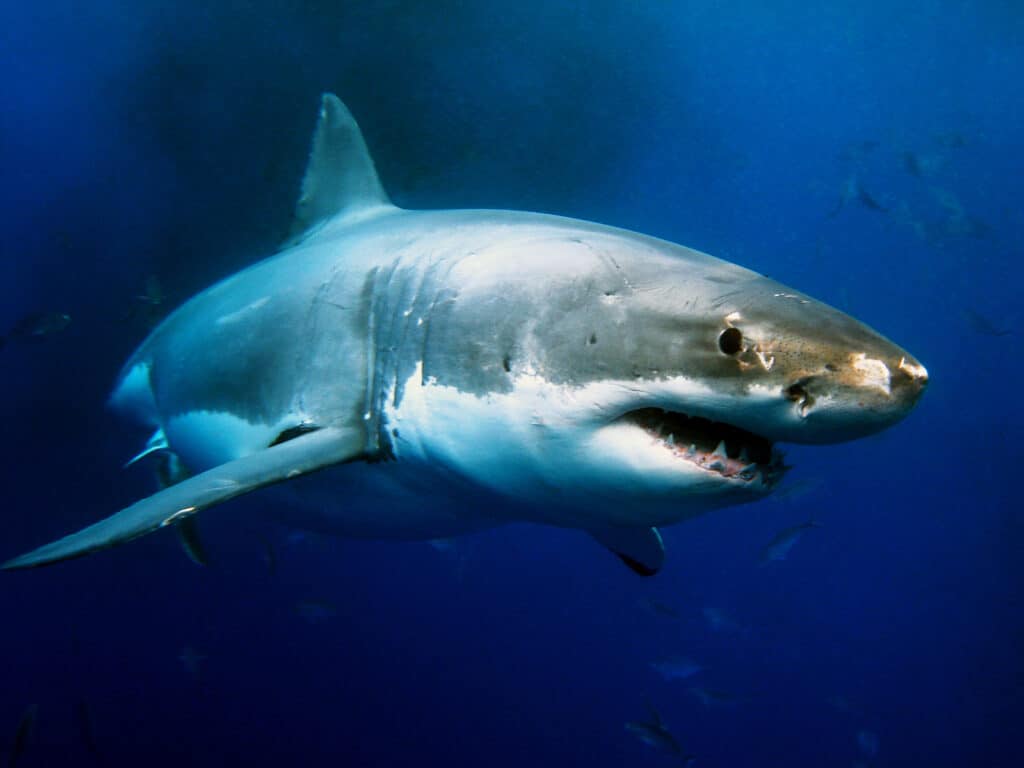
©Alexius Sutandio/Shutterstock.com
Largest Sea-Dwelling Crocodile vs. Great White Shark: Defenses
The great white shark has a large, cartilaginous body that would be hard for most sea creatures to successfully attack due to size alone. Moreover, the shark’s hunting senses would probably make it hard to ambush the shark. Failing that, great white sharks have a coloration that makes them hard to spot, and they can simply swim away from all but the fastest sea creatures.
Meanwhile, the sea-dwelling crocodile would rely on its size to ward off most challengers. Even so, the crocodile probably had a thickly built body with tough skin that was reinforced in osteoderms. Biting into this creature would be very difficult.
The great white shark has more defenses, but the sea-dwelling crocodile has more powerful physical defenses, so this is a tie.
Largest Sea-Dwelling Crocodile vs. Great White Shark: Offensive Capabilities
One of the many reasons that people fear the great white shark is its bite force. This creature can exert 4,000 PSI, driving 3-inch serrated teeth into its prey and tearing away huge amounts of flesh in a single bite. Combined with the shark’s speed, stealth, and hunting habits, great white sharks are a biological powerhouse.
Yet, the largest sea-dwelling crocodile was no less dangerous. Based on its size and jaw structure, it’s very likely that this crocodile had a greater bite force than a great white shark. However, its teeth were bullet-shaped, blunt-tipped, and only measured about 1 to 2 inches. They were designed to grab, hold, and crush prey.
The largest sea-dwelling crocodile has an offensive advantage based on greater bite force.
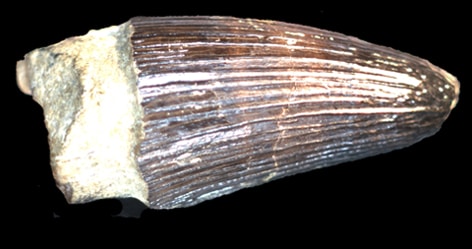
©Niko Hoffmann, CC BY-SA 3.0 <https://ift.tt/1KkadOC>, via Wikimedia Commons – License
Largest Sea-Dwelling Crocodile vs. Great White Shark: Predatory Behavior
The great white shark is an ambush predator that can use its amazing array of senses to find and kill its prey. They ambush with speed and silence, attacking from where their prey can’t see them.
Meanwhile, the crocodile probably attacked creatures in shallow water, possibly killing turtles and fish. However, they could have also grabbed land animals that went into the water for any reason.
The great white shark has the advantage in predatory behavior.
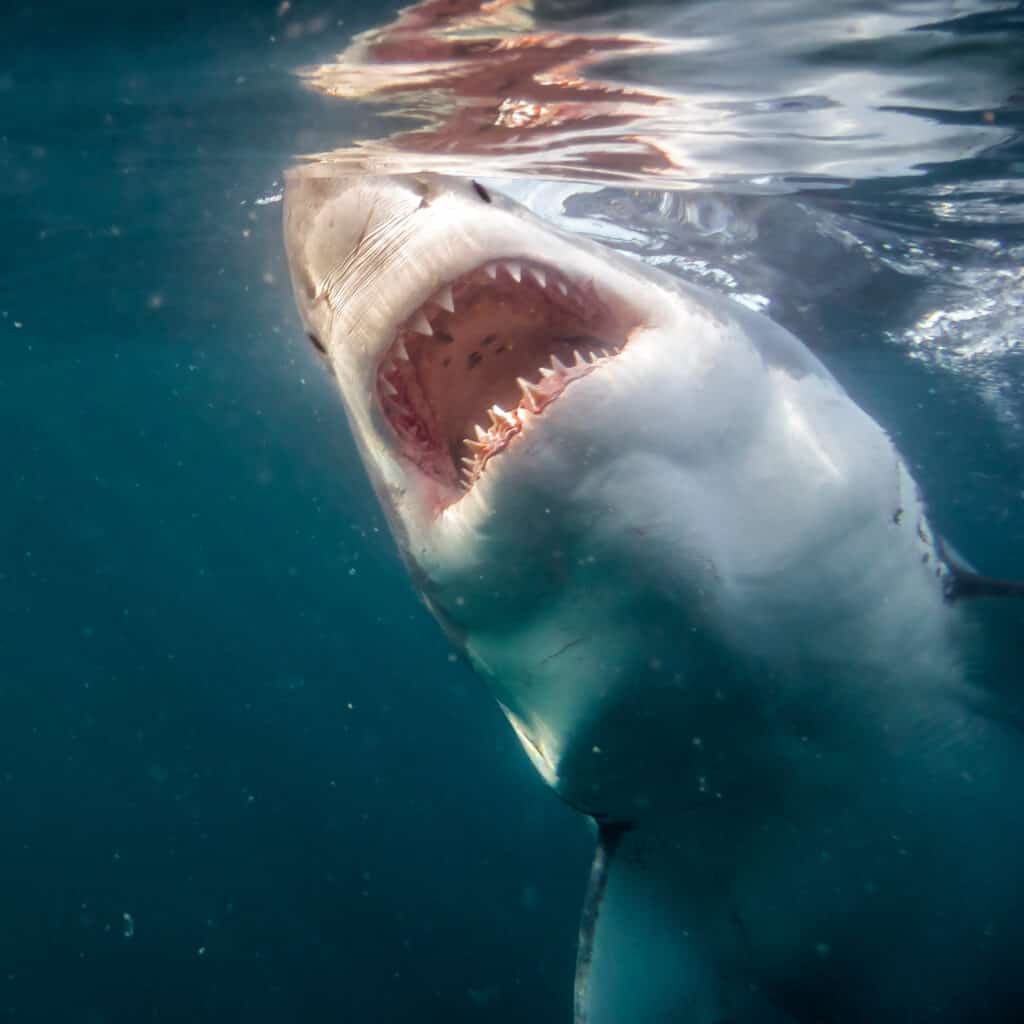
©Vincent Legrand/Shutterstock.com
Who Would Win in a Fight Between the Largest Sea-Dwelling Crocodile and a Great White Shark?
The largest sea-dwelling crocodile would win a fight against a great white shark. The great white shark would almost certainly land the first bite, but it would face a problem. The crocodile’s reinforced skin would diminish the power of the great white shark’s bites. Also, the crocodile’s size relative to the great white’s mouth could pose a problem with landing an effective bite. If the shark can’t bite the huge creature very well and rend a great deal of flesh at the start of the fight, the great white is going to face a serious challenge.
Injured, the largest sea-dwelling crocodile would counter, partially clamping down on the great white shark. The shark would wriggle free and keep trying to harass the crocodile’s hindquarters, receiving vicious tail smashes in return.
Having stunned the shark, the crocodile lands a huge bite with all of its force, clamping down on the great white shark and leaving it too injured to fight. Using its high bite force and teeth meant to bite, hold, and break bones, the crocodile breaks the shark’s cartilage-based spinal column.
While the crocodile probably couldn’t eat the massive shark, it would leave the shark too injured to fight back or ever hunt again.
If the largest great white fought against an average-sized crocodile, then the fight may end differently. Still, the great white would probably never hunt such a dangerous foe in the first place, and it would certainly face a significant risk by attacking such a large, vicious reptile.
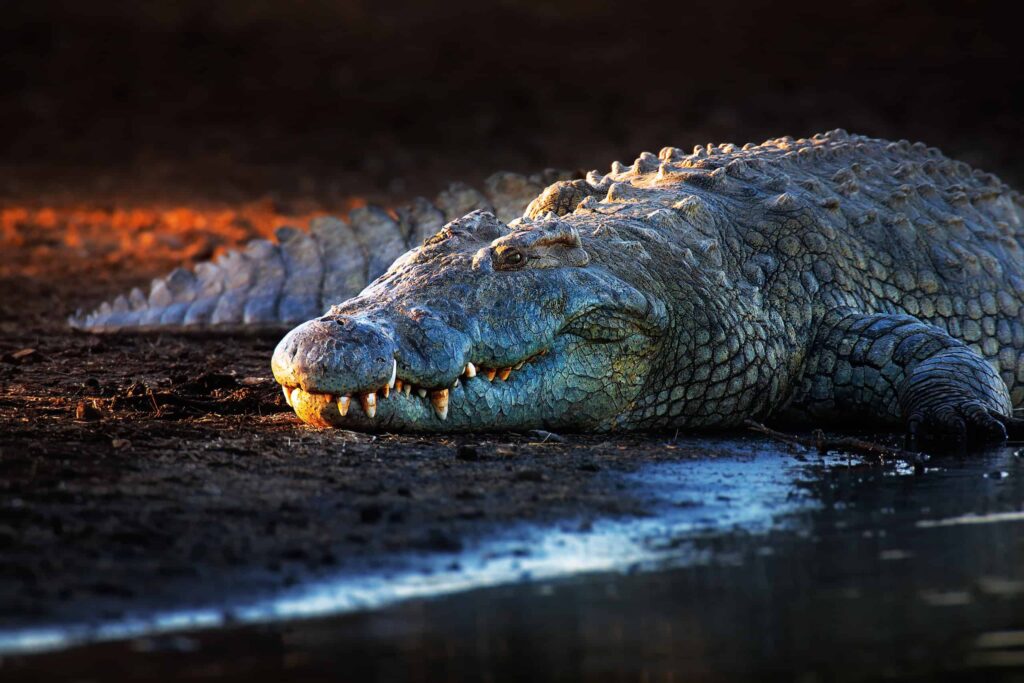
©Johan Swanepoel/Shutterstock.com
Up Next
- Epic Battles: Saltwater Crocodile vs. Anaconda
- Epic Battles: Megalodon vs. the Largest Crocodile Ever
- Epic Battles: Saltwater Crocodile vs A Pack of Wolves
The post Epic Battles: The Largest Sea-Dwelling Crocodile vs. A Great White Shark appeared first on AZ Animals.
from Animal News, Facts, Rankings, and More! - AZ Animals https://ift.tt/1LyGwTH